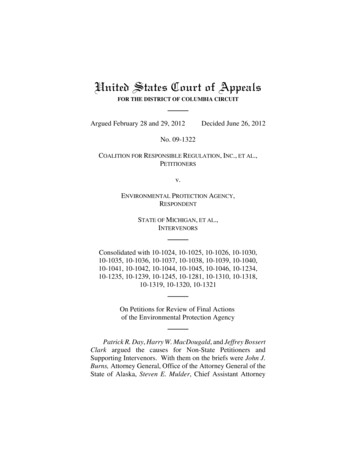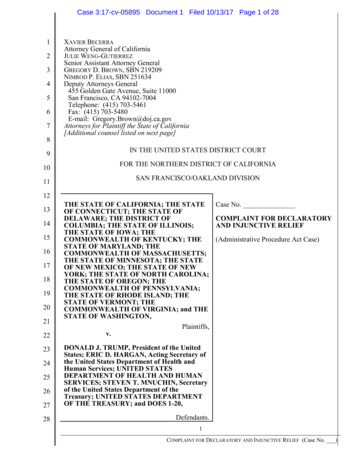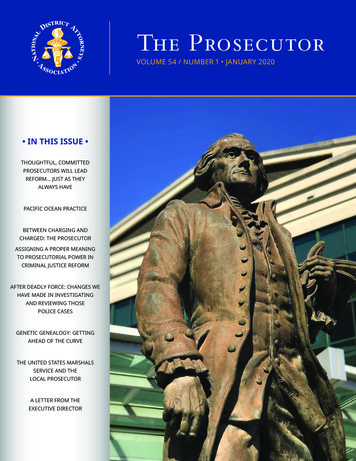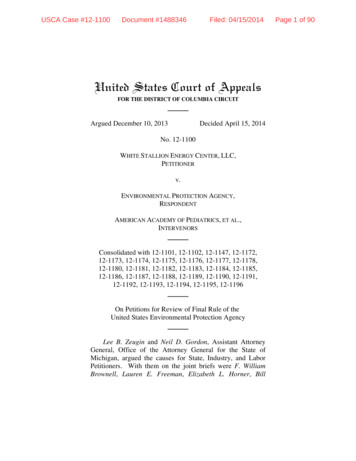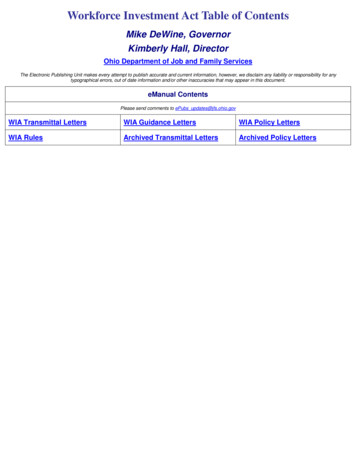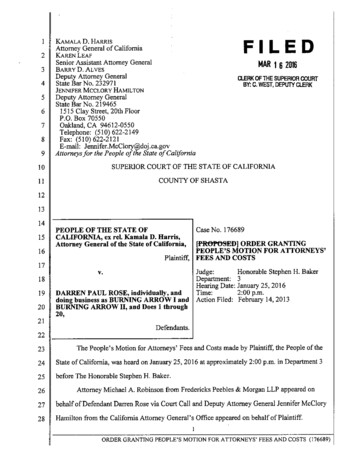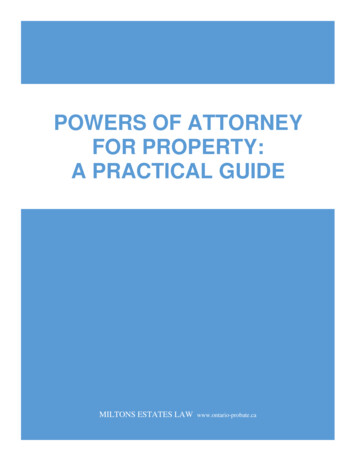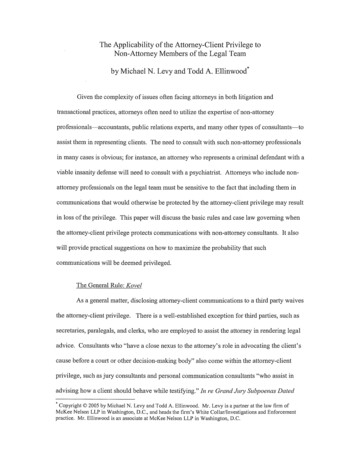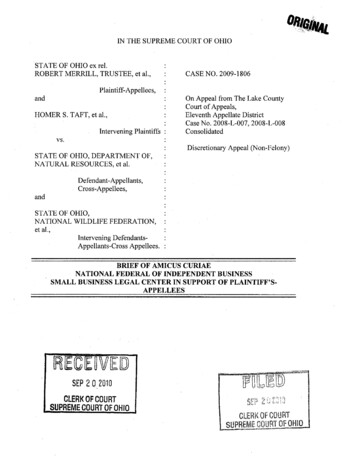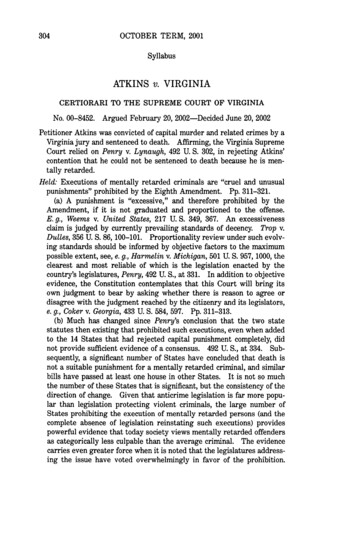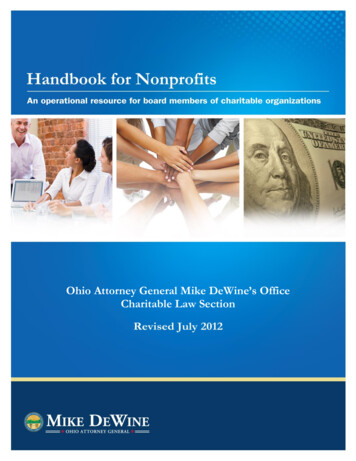
Transcription
Ohio Attorney General Mike DeWine’s OfficeCharitable Law SectionNonprofit Handbook – Ohio Attorney General Mike DeWine1
OHIO ATTORNEY GENERAL’S GUIDE FOR CHARITABLE ORGANIZATIONSTable of ContentsIntroduction .3Chapter 1: Charitable Organization BasicsEstablishing a Charitable Organization Living up to the responsibilities Guide for Board Members 455Chapter 2: State Oversight of Charitable OrganizationOverview .The Ohio Registration Process: Registration Simplified .Fees for Charitable Registration & Reporting .Annual Filing .Determination of Exemption .68101112Chapter 3: Nonprofit Fundraising and Professional SolicitationOverview .Fundraising methods Key players in fundraising efforts Requirements for professional solicitors and fundraising counsel .Stemming solicitation fraud Considerations in hiring solicitors .131315161617Chapter 4: Tips for Being a Wise DonorDonor tips . .Warning signs that should raise concerns . . . .What to do when you have concerns . .Develop a donor plan . 19202121Chapter 5: Reducing the Risk of TheftAvoiding Embezzlement Steps to Limit Exposure . What to do when suspicious activity is uncovered . 222326Chapter 6: Filing Complaints with the Charitable Law SectionHow to file a complaint .Frequently asked questions regarding complaints . .2828Nonprofit Handbook – Ohio Attorney General Mike DeWine2
For more information. . .32INTRODUCTIONCharitable organizations play a critical role in strengthening communities throughout the state. Theyoften take on noble causes and harness the energy and commitment of donors and volunteers insupport of their important missions.Making positive contributions to society as a whole by helping lead a charitable organization carriesgreat rewards. But it also carries great responsibilities.In exchange for the favorable tax arrangements granted to charities, these organizations must take careto use their resources in support of a charitable purpose. However, sometimes these efforts arethwarted by theft, fraud and a lack of serious attention to the operations and governance of thoseorganizations.One of the most time-honored responsibilities of attorneys general is to look after the interests of thosewho may not be able to speak up for themselves. This obligation is the underpinning for the variousrequirements related to nonprofit registration, filing and governance.When charities fail to act responsibly, the entire community suffers because resources aren’t directed tohelp the individuals and causes that should be benefitting. And other nonprofit organizations oftensuffer because their donors and volunteers wonder if their contributions are being used appropriately.The regulation of nonprofits is essential to donors, volunteers, granting agencies, the community andnonprofits. Charity regulations help prevent fraud, provide confidence for donors and create legalmechanisms to ensure funds are not used for personal gain.Nonprofit Handbook – Ohio Attorney General Mike DeWine3
CHAPTER 1: CHARITABLE ORGANIZATION BASICSESTABLISHING A CHARITABLE ORGANIZATIONThere are many different paths that individuals can decide to follow in setting up a charitableorganization. Discussing the various options with a lawyer can help provide a more thoroughunderstanding of the risks and benefits of incorporating or pursuing a specific tax status.A common first step for many charities is filing articles of incorporation with the Ohio Secretary ofState’s Office. The articles of incorporation must describe the purpose of the organization, list namesand addresses of the group’s directors and name a statutory agent who will serve as a contact personfor various types of official documents. During this process, the Ohio Secretary of State’s Office will letorganizers know if the name of the entity is already in use by another group. Explanations about all ofthe requirements can be found at www.sos.state.oh.us.Additionally, a code of regulations must be developed to outline the various processes, procedures andrules that will govern the organization. This document states the duties of officers, rights of members,budget processes and other administrative and governance issues. Care must be taken in developingthese documents because they will serve as the primary resource for organizations seeking tax-exemptstatus from the Internal Revenue Service (IRS).After its initial filing with the Ohio Secretary of State, an organization must file a Statement of ContinuedExistence every five years. This filing, which must be signed by a director, officer or three members,verifies that the organization is still actively engaged in its work. Failure to file this statement can resultin the Secretary of State canceling the articles of incorporation. The Ohio Secretary of State’s Officeprovides a mailed reminder for this, making it essential to keep the office informed of any addresschanges or changes in the statutory agent.The IRS is the only entity that defines an organization’s tax status. Many nonprofit organizations chooseto seek a 501(c)(3) status, which enables donors to deduct donations they contribute to theorganization. There are other benefits from this status, and discussions with a lawyer can provide abetter understanding of the various options available.The IRS applies several criteria when determining whether 501(c)(3) tax-exempt status should begranted. The exemption is granted for organizations that operate exclusively for a purpose that falls intoone or more of these categories: charitable, religious, educational, scientific, literary, fostering sportscompetition or preventing cruelty to children and animals. The organization must be operated for thebenefit of the identified purpose and earnings cannot benefit private shareholders or individuals. Asubstantial part of the organization’s activities cannot be to influence legislation.If organizations are granted tax-exempt status, they will receive a determination letter from the IRSannouncing the decision. This document will be important to retain and may be needed for future filingsand business. The IRS has many publications and resources available in the charities and nonprofitsection of its Web site at www.irs.gov/charities.Nonprofit Handbook – Ohio Attorney General Mike DeWine4
LIVING UP TO THE RESPONSIBILITIESRunning a tax-exempt nonprofit organization is an important responsibility — for the staff andvolunteers. The organization was formed to promote or support a particular charitable purpose, such asproviding assistance to the sick or aged, enhancing educational opportunities for children, providingtraining in the arts or any number of services that many in the community depend upon. Therefore, theleaders of these organizations must be able to demonstrate that the significant tax benefits they arereceiving from their tax-exempt status are benefiting their designated charitable purpose.Charitable organizations are required to file an annual information return with the IRS. This return, Form990, is a public document that provides valuable information about the accomplishments, revenues andexpenditures of each filing organization. The public can access this tax document in order to analyzehow the organization spends its money and what types of programming the organization provides.Consumer education efforts have been helpful in teaching potential donors how to inform themselvesabout the groups they support and whether the organizations expend a substantial amount onadministration rather than on work related to their charitable mission. Organizations must provide acopy of their Form 990 to anyone who requests it. Additionally, the Guide Star website provides theForm 990s of charitable organizations across the country (www.guidestar.org ).Nonprofit organizations, unless they qualify under IRS exemptions, must file an annual Form 990 return.The IRS also can revoke the tax-exempt status of organizations that run afoul of their responsibilities inpursuing charitable causes. Organizations should regularly check with the IRS to monitor changes in theannual filing responsibilities.Board members play a very important role in the operation of the non-profit. Board member training isoffered at the Attorney General’s Office through webinars and through various speaking engagements.Please see the Guild for Charity Board Members at the following -forBoard-Members.aspx .Nonprofit Handbook – Ohio Attorney General Mike DeWine5
CHAPTER 2: STATE REGISTRATION AND OVERSIGHT OF CHARITABLE ORGANIZATIONSOVERVIEWIn Ohio, the authority of the Ohio Attorney General to regulate nonprofit organizations rests in commonlaw, which can be traced back centuries, and in specific statutes passed by the Ohio General Assembly.The prime focus of charitable oversight is to ensure that charitable causes and beneficiaries areprotected and that assets are not being diverted for personal use.Ohio’s General Assembly, like those of many other states, has developed a registration and filingrequirement for many charities. This system provides transparency and information for members of thepublic interested in exploring details about charities.These filings are public record available for citizen review, and citizens with questions about charities areencouraged to contact the Ohio Attorney General’s Office to ensure the organization is in compliancewith the various requirements. The information in these reports also assists investigators in the OhioAttorney General’s Office in responding to allegations of fraud and other improprieties.The filing and registration requirements are embodied in two different statutory provisions — the OhioCharitable Trust Act (ORC 109) and the Ohio Charitable Organizations Act (ORC 1716). Each of thesesections includes specific exemptions and requirements, and some organizations may be subject to bothrequirements. It is important to carefully read and determine which requirements apply to anyorganization.The Ohio Attorney General’s Office requires charitable organizations to comply with their filingrequirements through its online system that can be found at www.OhioAttorneyGeneral.gov.Representatives from each charity create accounts in the system that enables them to make changes tothe data on file about the group and complete required filings.The Attorney General’s Office recommends at least three people from each organization have accountsin the system to ensure multiple representatives receive important notifications. For new organizationsthat have never registered in the past, the first user from the group needs to provide organizationaldetails and information. The system is designed to display data already on file for registeredorganizations.Each person who uses the online system will receive email reminders about filing deadlines and willreceive notifications each time anyone makes changes to the organization’s data. Users can beconnected to multiple organizations, enabling lawyers, accountants and others to stay in the loop forseveral groups.The system is designed to be user-friendly and intuitive. Orange question marks throughout the systemprovide additional guidance for those with questions about particular requests for information.Additionally, there is a user guide that provides in-depth information on the filing system.The system poses questions to the organization representatives and, based on that person’s responses,Nonprofit Handbook – Ohio Attorney General Mike DeWine6
determines what information is needed to ensure proper compliance under both the Trust andSolicitation acts. The system also calculates what fees, if any, are owed.Much of the information for the filings can be drawn from the IRS 990 form, such as the listing of boardmembers, revenues, assets, and program and total expenses. It is helpful to have the IRS 990 formavailable when completing the filing.For organizations that have never registered or filed in Ohio before, additional documents will need tobe uploaded. Documents required to complete the registration process include: articles ofincorporation, bylaws or governing documents, and a federal tax exemption determination from the IRSgranting tax exempt status.For the first time, the public can check the Attorney General’s website for general information aboutgroups and whether organizations are in compliance with the registration requirements. Using theResearch Charities function on the website, prospective donors and others can use this information tomake wise decisions about contributions. Charities can also refer potential donors to the website forconfirmation of compliance with state registration rules.A team of account clerks works with charity representatives to assist them in complying with the filingrequirements. Charities are urged to contact the office with questions about their filing status by calling1-800-282-0515.Nonprofit Handbook – Ohio Attorney General Mike DeWine7
THE OHIO REGISTRATION PROCESS - REGISTRATION SIMPLIFIEDThe Charitable Law Section works with nonprofit officials to get their groups in compliance. Contact anaccount clerk in the Charitable Law Section at 1-800-282-0515 for additional assistance.How do I access the online charitable registration system?There is a link to the online charitable registration system from the web page dealing with charitableregistration issues and can be found tration.What kinds of charitable organizations have to file with the Ohio Attorney General’s Office?In general, Ohio 501(c)(3) organizations and 501(c)(4) health-care organizations must register under theOhio Charitable Trust Act unless they meet one of eight exemptions. Other organizations that operatefor a charitable purpose may also be required to register. Out-of-state entities may be required toregister if they have assets in Ohio or a majority of the governing body is in this state. After filing theinitial registration with the office, the organization must file an annual financial report. A sliding scale forfees is based on the organization’s assets.Nonprofits that intend to solicit contributions from Ohioans must register and submit financial reportswith the Attorney General’s Office each year under the Charitable Organizations Act. Ohio 501(c)(3)organizations that have been in operation for two or more years are not required to file under theCharitable Organizations Act if they have properly filed under the Charitable Trust Act each year. The feeis based on the amount of contributions received each year.There are circumstances when Ohio charities might be required to file under both provisions. The onlinecharitable registration system automatically determines for users what information is required based onthe responses provided to questions.How can I check if my charity is properly registered?Organization representatives can log into the online charitable registration system and view a to-do listwhich will list any filings or activities that are due for the organization. If there are no activities listed,the organization is current. Additionally, consumers can conduct searches for specific organizations, findbasic contact information, and learn whether that organization is properly earch.aspx.Who from my charitable organization should register to use the online registration system?Multiple people can be connected to an organization’s charitable filings, and it is suggested that severalpeople from each group register to use the online registration. Because of the turnover of volunteers orstaff, leaders far too often can overlook the group’s filing responsibilities. Because the system providesemail reminders to everyone associated with the organization, the chances of annual filings beingforgotten are reduced. This should also help reduce the risk of encountering late fees. Organizationleaders should also remember to register new email addresses when there are changes to ensure thatthe reminders and other notifications are properly directed. Lawyers, accountants, and other advisersfor a charity may also want to register in connection with the organization.What do I need to use the online charitable registration system and how do I get started?Nonprofit Handbook – Ohio Attorney General Mike DeWine8
All that is needed to complete filings requirements is access to the internet and an email address.Requesting an account is easy, and multiple people connected with the organization can have accounts.The system uses the organization’s Employer Identification Number (EIN); users must know the EIN toaccess that organization’s records. Those completing the filing should have handy the basic informationabout the organization, such as contact information, financial data, and other information included inthe IRS 990 return.What information and documents are required for charitable reporting?The online charitable registration system makes determinations about what information or documentsmust be provided based on responses to questions. Many of the responses can be found on theorganization’s informational 990 filings with the IRS. For organizations that have never registeredbefore, a copy of the IRS determination letter of exempt status is required, along with a copy of thearticles of incorporation, bylaws, constitution, trust agreement or other creating documents. Thesedocuments can be either uploaded into the online charitable registration system, or mailed to:Ohio Attorney General’s OfficeCharitable Law Section150 E Gay St, 23rd FloorColumbus, Oh 43215What are the advantages to having an online charitable registration system?The online charitable registration system is designed to simplify the process and take the guesswork outof the filing requirements by eliminating confusion over which forms are required and which statutoryprovisions apply. Based on responses provided, the system will automatically make determinationsabout what information, documents, or fees might be needed. Because users must provide emailaddresses when registering with the system, filing reminders and confirmations can be sent to everyoneconnected with the organization. Because the information is being collected electronically, it can bemore readily provided to the public through an online search tool. Organizations will now have theability to tell potential donors to use the online research charity tool on the web page to verify that thegroup is compliant with its filing requirements. Online filings are an efficient way to enhancetransparency of operations and enhance the level of oversight provided to the charitable sector,increasing the level of public confidence in Ohio’s charitable organizations.I handle the filings for multiple charitable organizations. How will the system work for me?Users of the online charitable registration system can gain access to the accounts of multipleorganizations by providing the EIN of the group. Each time users log into the system, they will be askedto select which organization they want to access.What kind of support can I find to make the online charitable registration system easy for me.The online charitable registration system is designed to take the guesswork out of the charitable filingrequirements since the system produces questions based on the responses provided. It is designed to besimple and intuitive. A user guide is provided on the Attorney General’s bleregistration, which will provide additional assistance.Additionally, users can contact the Ohio Attorney General’s office for assistance by calling 800-282-0515,or email a question to CharitableRegistration@OhioAttorneyGeneral.gov, or submit a question orconcern through the help function within the system.Nonprofit Handbook – Ohio Attorney General Mike DeWine9
I don’t have a computer. How can I take care of my charitable organization’s filing responsibilities?Public libraries, schools, community centers, and other public locations often have computers availablefor citizens to use. The system is designed to be simple and intuitive and a reference guide is available towalk users through the system. Organizations may also consider recruiting board members or volunteerswho can assist in the online filing. Young people and those involved in community service may be goodprospects for providing assistance on charitable filings, as well as the online 990 filings required by theIRS. Veteran leaders of the organization could provide the detailed information about the organizationwhile a volunteer completes the online filing.If I am a subsidiary or chapter of a national charitable organization, do I need to register?A parent organization is one that has been specifically recognized by the IRS and is permitted to file agroup tax return on behalf of its chapters, branches, and/or affiliates. If you are a chapter, branch, oraffiliate of a parent organization, you should have documentation from the parent organization thatconfirms that you are in good standing and that your financial reports are included in the federal groupreturn. If you do not have the appropriate documentation or the parent organization is not properlyregistered with us, then your organization is responsible for filing individual registration documents onbehalf of the chapter or division.How do I determine the date a trust was funded?Trusts may be funded in advance of or following the death of a beneficiary. Please indicate the date thatfunds were made available to the trust.THE OHIO REGISTRATION PROCESS - FEES FOR CHARITABLE REGISTRATION AND REPORTINGThe fee schedule for Ohio groups registering under the Ohio Charitable Trust Act is based on the group’sassets:AssetsLess than 25,000 25,000– 100,000 100,000– 500,000 500,000 or moreFees 0 50 100 200There is a 200 late fee assessed for groups failing to submit fees by the deadline. The date of the onlinesubmission or the postmark date for checks mailed to our office are used to determine timeliness.For groups soliciting in Ohio and registering under the Charitable Organizations Act, the fee schedule isbased on the amount of contributions received:ContributionsLess than 5,000 5,000– 25,000 25,000– 50,000 50,000 or moreFees 0 50 100 200All checks should include the organization’s EIN and be written to the Treasurer, State of Ohio. TheNonprofit Handbook – Ohio Attorney General Mike DeWine10
online charitable registration system will automatically calculate the fees due.THE OHIO REGISTRATION PROCESS - ANNUAL FILINGHow often should I access the online charitable registration system?Organization representatives should access the system whenever updates to the address, contactinformation, or other important information about the organization changes. When logging in to viewthe information, users should pay attention to the to-do page which lists any activities that are due forthe organization. Organization representatives will need to complete a filing annually.How will I know if someone has made a change to the information filed for my organization?Email notices will be sent to all email addresses connected with each organization every time a changeor filing is completed. The system will also provide email reminders and confirmations to all usersconnected with an organization. For these reasons, we suggest that multiple people with eachorganization should have accounts in the online charitable registration system so that details about filingrequirements can be widely shared among leaders of the organization. This will prevent notices fromfalling through the cracks when individuals are no longer active with the group.When are the deadlines for filing charitable reportsThe annual filings are due on the 15th day of the fifth month following the close of a fiscal year. Forexample, if a group’s fiscal year ends Dec. 31, the filing is due on May 15. The office does not grantextensions but abides by extensions granted by the IRS. If an organization has requested and received anIRS extension, the Ohio filing will be due on the same date as the IRS deadline.For organizations planning to solicit within the state, the registration process must be completed priorto soliciting gifts. For new Ohio organizations, registration is required within six months of the creationof the trust and prior to soliciting. Determinations on when groups have submitted materials are basedon the time and date of the online submission, unless checks and other materials are mailed to theoffice. When groups elect to mail a check instead of paying online, the submission date will be based onthe postmark date on the envelope. Late fees may be assessed for materials mailed after the due date.For this reason, it is best to submit payments online.How will I know if my charitable organization is current with its filing requirements?Organizations can monitor the to-do page in the online charitable registration system. If no tasks oractivities are shown, the organization is current on its filings. Organizations and the public can findinformation about an organization’s compliance through the web earch.aspx. Consumers can search for an organizationand find basic contact information and a notation about whether the group is properly registered.How do I tell you that I filed for an extension with the IRS?The Ohio Attorney General’s automatically grants any IRS extension; therefore, you do not need to let usknow that you filed for an extension with the IRS and you cannot do this within the online system. Wewill still send reminders regarding upcoming deadlines, but you can disregard those reminders if yourequested an extension.What changes within my charitable organization require updates to the Attorney General’s Office?Any amendments to an organization’s creating documents should be filed immediately with theNonprofit Handbook – Ohio Attorney General Mike DeWine11
Charitable Law Section. Changes in the address, telephone number, officers, amendments to the IRS 990forms, and other pertinent details also should be shared with the Attorney General’s Office.A donor has asked our charitable group for verification of registration. How do I provide that?The new online charitable registration system has simplified that process. Instead of using the“Verification of Registration with the Ohio Attorney General” form, organizations and the public can findinformation about an organization’s compliance online x. Consumers can search for specific organizationsand find basic contact information and a notation about whether the group is properly registered.Additionally, organizations can monitor the to-do page in the online charitable registration system. If notasks or activities are shown, the organization is current on its filings.THE OHIO REGISTRATION PROCESS - DETERMINATION OF EXEMPTIONHow do I know if my charitable organization might be exempt from any of the filing or registrationrequirements?Through the online charitable registration system, organizations can submit a request for adetermination from the office about whether it qualifies for an exemption from charitable filingrequirements. So that legal staff in the Ohio Attorney General’s office can make a determination onwhether an exemption is appropriate, supporting documentation such as bylaws and other informationmust be uploaded into the system or mailed to the office. The requesting organization will receive anemail and a letter granting or refusing the exemption, and that information will be entered into theorganization’s file. Failure to provide supporting documentation within one month of the request willresult in a rejection of the request. Materials can be mailed to:Ohio Attorney General’s OfficeCharitable Law Section,150 E Gay St, 23rd FlColumbus, OH, 43215You can also email the materials to CharitableRegistration@OhioAttorneyGeneral.gov or documents canbe uploaded into the online charitable registration system when the request is made.What types of organizations are exempted from the various charitable filing requirements?The most common exemptions under the Charitable Trust Act are: Parent-teacher associations; fraternities; and alumni, booster, or social clubs organized andoperated in conjunction with and for the benefit of students of primary and secondary schools Churches Schools that maintain regular faculty and curricula and maintain a location where studentsattend Qualifying charitable remainder trusts or trusts with revocable charitable interests Charitable trusts with neither assets nor a majority of the governing body in OhioCommon exemptions under the Charitable Organizations Act include: Churches Educational institutions if the contributions sought are confined to alumni, faculty, trustees,students, and their families Booster clubs operating for the benefit of students of public primary or
Nonprofit Handbook - Ohio Attorney General Mike DeWine 6 CHAPTER 2: STATE REGISTRATION AND OVERSIGHT OF CHARITABLE ORGANIZATIONS OVERVIEW In Ohio, the authority of the Ohio Attorney General to regulate nonprofit organizations rests in common law, which can be traced back centuries, and in specific statutes passed by the Ohio General Assembly.
